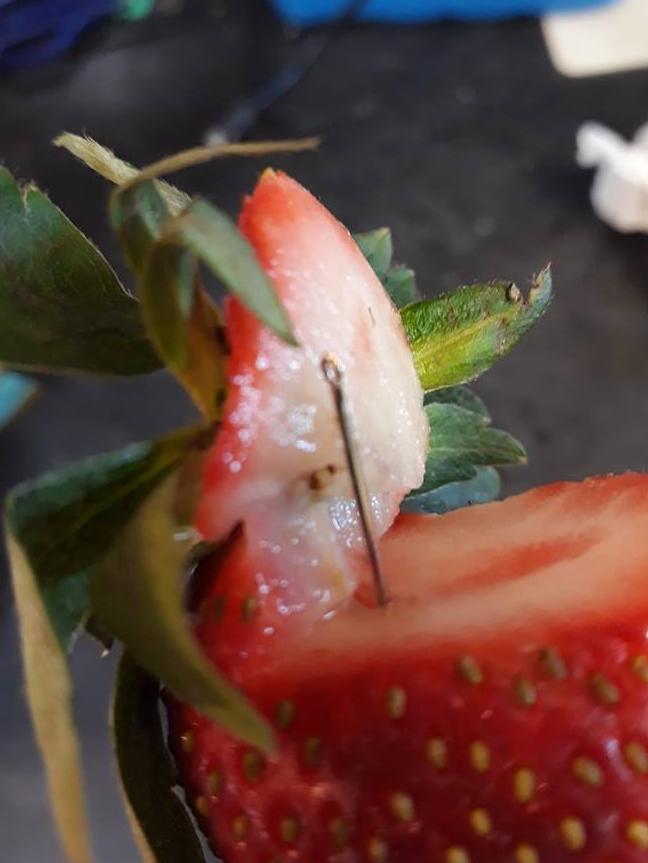Tougher food sabotage laws won’t work
PEOPLE who put needles in strawberries, or make hoax claims, are obviously not rational human beings. I hope I’m wrong, but longer jail terms won’t make them stop their idiocy, writes Terry Sweetman.
Rendezview
Don't miss out on the headlines from Rendezview. Followed categories will be added to My News.
PRIME Minister Scott Morrison reckons people who sabotage strawberries are cowards and grubs.
I would add that they’re probably at least a little crazy.
People who stick needles in strawberries, or joke about it on social media, are not the sort of people who approach things rationally. Nor are people who think it’s jolly to copy such potentially lethal stupidity or to make hoax claims of finding needles in their fruit. So there is actually not a whole lot of rationality in wielding the hammer of savage penalties to stop or prevent this sort of insidious assault on an industry and on our comfort zones.
Morrison took time off the from the parliamentary Mexican wave thing to announce the government would increase from 10 to 15 years the maximum prison sentence for food tampering offences. And new offences linked to “reckless” conduct, including hoaxes and social media posts showing fruit being tampered with, will attract penalties of up to 10 years imprisonment.
This is all going to happen under laws to be introduced immediately, the sort of precipitous legislative action that doesn’t always have good results when considered more leisurely in the courts of law.
But given the federal and state jurisdictions, we’re not exactly short of food tampering laws or policemen to enforcement them.
Personally, I don’t much care if the sort of people who would risk the lives of others through malicious stupidity go to jail for 15 years.

Equally, I don’t much care if people who make sport of such things spend 10 years behind bars.
I hope it will work but, apart from making people feel good, I’m not sure it will achieve a lot.
And I’m not sure how we would measure any success or failure.
In Queensland, and Australia generally, the Penalties and Sentences Act sets out factors that a court must take into account when imposing a sentence.
These principles include justly punishing an offender, protecting the community, demonstrating the community’s denunciation of such conduct, and deterring an offender or anyone else from committing the same or similar offence.
Ten or 15 years in the slammer would fit the bill on the first three counts (although people would and will argue about the justness of it) but I’m not sure it would deter others.
Deterrence presumes a degree of rationality that seems absolutely absent in the case of people who sabotage the food chain for no apparent gain.
Griffith University criminologist Dr Danielle Harris says food tampering, although rare, is a very deliberate act by someone who craved attention. “What we’re seeing here is somebody who wanted to inflict harm and wanted to instil fear,’’ she said.
If we ever track down the culprit we might find a sort of perverted rationality in the motive and we would certainly find deliberate foresight. But randomly booby trapping food, not knowing or caring who the victim might be, is not the action of a rational person.
Tough laws might deter those who think and plan their actions, those who weigh the risk against the potential gain, but nut cases usually aren’t in that category. Anger is a potent antidote for rational thought.

In Queensland we’ve been down this track before. A dozen years ago we had a mentally disturbed woman sprinkle rat poison on the salad bar at two Sizzlers restaurant. The government reacted with food tampering laws promising up to 10 years in jail. Not long after, then Premier Peter Beattie came out waving the laws after a woman found a lump of metal in a cake she was eating, prompting a national recall of range of pastries. Since then food tampering cases have until now been rare or non-existent. Whether the laws had anything to do with that happy state of affairs is problematic.
Obviously they did nothing to deter whoever is responsible for the current outrage and it is open to question whether another five years would achieve any more. Former police officer and now Liberal National Party MP LLew O’Brien cast doubt on the effectiveness of the law because he feared judges would treat culprits “in a soft way”.
Anyone who has ever reported on the courts knows this sort of “bleeding heart judges” wail just comes with the territory of police work. But he might be right in this case because a 15-year term for food tampering when the minimum for murder is 14 years would challenge any judge and anyone concerned with justice.
The risk of detection is always a bigger deterrent to crime than the penalties applied but catching this culprit (and all the imitators and hoaxers) is literally searching for a needle in a strawberry stack.
Even if the culprit is never caught, he or she will eventually lose interest. In meantime vigilance, not vengeance, is our most powerful weapon.


